| WWW.SEABEAN.COM HOME PAGE | Things That Float MAIN PAGE | E-MAIL Contact Info |
Argonauta argo
The Paper Nautilus or Argonaut, Argonauta argo, is a Cephalopod mollusc that lives a pelagic existence in the tropics and subtropics. Despite its name, the shell of the Paper Nautilus is not made from paper; the shell is "paper thin" (i.e., very fragile) and constructed of calcium carbonate (like most seashells) only by the female of the species and only for purposes of protecting her eggs. Additionally, the Paper Nautilus is not a nautilus at all, but rather is a member of the order Octopoda (which includes the octopusses) and family Argonautidae.
The shells of the Argonaut are occasionally blown toward the shore, and even wash ashore periodically.
It is an uncommon event to find the animal still clinging to the shell.

Photo (above): Carly de Maye, 3/18/2004
Peanut Island, Palm Beach County, Florida USA
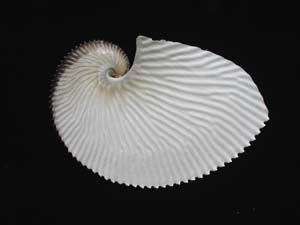 |
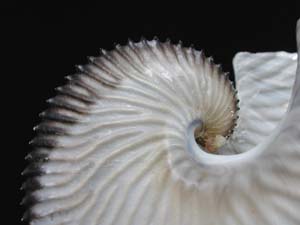 |
![]()
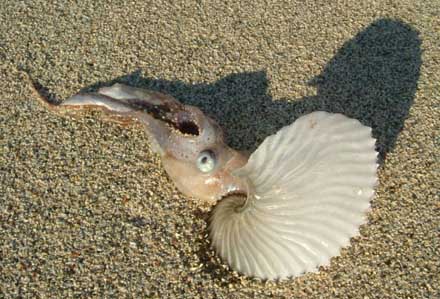
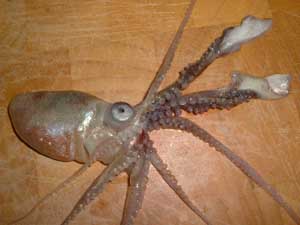
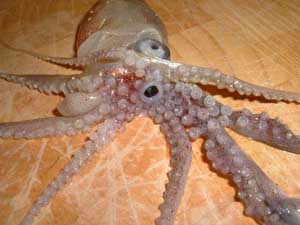
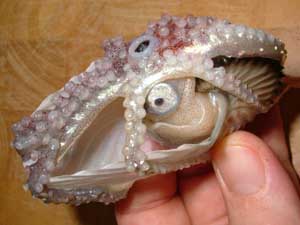
The four photos immediately above, taken by Christopher Boykin,
are of a specimen washed shore in Miami, Florida (USA) on Nov. 19, 2004.
The following text is from page 328 of:
Introduction to MOLLUSCA by prof. Richard Owen (1858)
(Kindly brought to my attention and provided by C. Arnal)
|
The knowledge of the varying forms of the living Mollusks, of their habits and powers, has been increased, and is likely to be materially advanced, by the rapidly extending practice of preserving them in confined spaces of sea or fresh water. Poli, Montagu, and before them probably other lovers of nature, resident near the sea, availed themselves of large vessels to keep alive, in frequently renewed sea-water, the marine animals in the study of which they were interested. But to Madame Jeannette Power (n裪 de Villepreux), according to the testimony of Professor Carmelo Maravigna, in the Journal du Cabinet Litt象ire de l'Academia Gioenia, of Catania , for December 1834, ought to be attributed, if to any one individual, the invention and systematic application of the receptacles now called Aquaria, to the study of marine, and principally of molluscous animals. Madame Power invented three kinds: one of glass, for preserving and studying living Mollusca in a room; another, also of glass, for small Mollusks, protected by an external cage of bars, in which they could be kept submerged in the sea, and withdrawn at will for inspection; and a third kind of cage for larger Mollusks, which could be sunk and anchored at a given depth in the sea, and raised, when required, for the purpose of observation and experiment. With these different kinds of molluscous menageries, of which the first answers to our present improved and enlarged aquaria, Madame Power carried on her observations and experiments from the year 1832 to 1842 at Messina in Sicily.
She determined the question of the true relation of the Argonauta, or Paper Nautilus, to the delicate boat-like shell which it inhabits. She first showed that the so-called "sails" were normally applied over the exterior of the shell, and proved experimentally that they were the organs which formed and repaired the shell. She proved that the Bulla lignaria preyed upon, and by its strong gizzard ground down and digested, the Dentalium entale. She described the curious manoeuvers by which the Astropecten aurantiacus seized and conveyed to its mouth and stomach small Naticae. And many other interesting facts were brought to light by this persevering and ingenious observer, through the application of the "Gabioline alla Power", as her aquaria were termed by the Gioenia Academy, some years before the practice of so studying aquatic animals was introduced and diffused in this country. |
Although this website is dedicated to sea-beans,
"things that float and wash ashore" are often of interest to sea-beaners.
|
|
Things That Float: Paper Nautilus or Argonaut Argonauta argo ALL web pages © www.seabean.com --- All rights reserved. ALL photos © www.seabean.com or other photographers individually credited. Use of ANY photo without written permission is prohibited! |